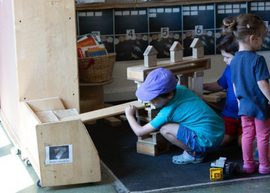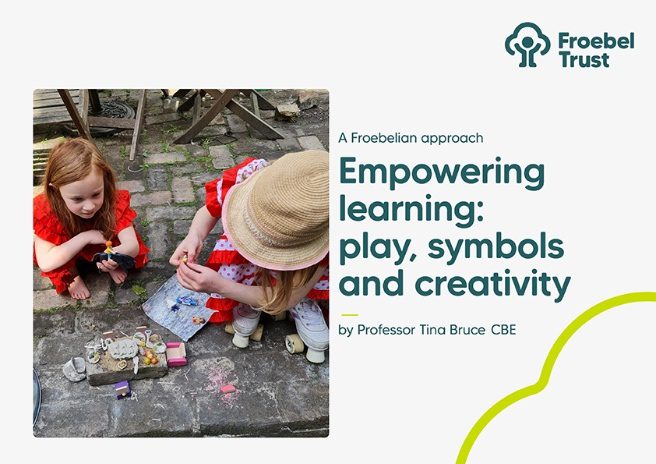An article by Professor Tina Bruce.
Play is about wallowing in ideas, feelings and relationships and the prowess of the physical body.

Play cannot be pinned down into a neat, measurable definition. Different philosophies of early childhood education see play through different lenses and make decisions about whether play is important - or if it is - how it is important.
The following features are drawn from and reconnect with Friedrich Froebel’s approach to early childhood play locating this amongst an evolving literature, some of which does not chime with his explorations of childhood play, and much of which does.
- Free flow play actively uses direct, first -hand experiences, which draw on the child’s powerful inner drive to struggle, manipulate materials, explore, discover and practise over and over again.
- Play exerts no external pressure on children to conform to externally imposed rules, goals, tasks or a definite direction. In this it differs from games. But the externally set rules in games enable children to experiment with breaking, making and keeping rules in the safety of their free flowing play.
- Play is an active process without an end product. When the play fades, so does its tangibility. It can never again be replayed in exactly the same way. It is of the moment and vanishes when the play episode ends. This aids flexibility of thought and the adaptability central to the intellectual life of the child.
- Play is intrinsically motivated. It does not rely on external rewards. It is self-propelling. Children cannot be made to play. The circumstances and relationships need to be right for the child’s play to begin to flow.
- Play is about possible, alternative, imagined worlds which involve ‘supposing’ and ‘as if’ situations. These lift participants from the literal and real to a more abstract and higher level of functioning. This involves being imaginative, creative, original and innovative. The symbolic life of the child uses life experiences in increasingly abstract ways.
- Play is sustained, and when in full flow, helps children to function in advance of what they can actually do in their real lives. They can drive a car, perform a heart operation, be a shop keeper.
- Play can be initiated by a child or an adult, but if by an adult he/she must pay particular attention that the adult’s play agenda is not the most important or only one. Free flowing play is more like a conversation with each listening to and tuning into the other.
- Play can be solitary and gives children agency and a sense of control over their lives. It supports children in developing awareness and strength in their own ideas, feelings and relationships. It gives personal space for contemplation and well being because it gives strength to deal with life’s events.
- Play might be in partnerships between children or between adult and child. Or it might be in a group with or without an adult participating. Adults need to be sensitive to children’s play ideas, feelings and relationships and not invade, overwhelm or extinguish the children’s possibilities for free flowing play. Freedom with guidance is a delicate balance.
- Play is about wallowing in ideas, feelings and relationships and the prowess of the physical body. It helps the process of becoming aware of self in relation to others and the universe. It brings unity and interconnectedness.
- During their free flowing play children use the technical prowess, mastery and competence they have developed to date. They are confident and in control. Play shows adults what children already know and have already learnt more than it introduces new learning.
- Play is an integrating mechanism which brings together everything the child has been learning, knows and understands. It is rooted in real experience that it processes and explores. It is self healing in most situations and brings an intellectual life that is self aware, connected to others, community and the world beyond. Early childhood play becomes a powerful resource for life both in the present and the future.
March 2020
About the author
Tina Bruce trained as a primary teacher at the Froebel Educational Institute, now part of University of Roehampton. She went on to become a Froebelian educator guided by principles that promote a holistic approach to teaching young children. Tina has played an instrumental role in laying the foundations of early education as co-ordinator of the Early Years Advisory Group to successive government childcare ministers for 10 years. In 2008, she was awarded a CBE for services to early years education. Her hugely influential articles and books address key Froebelian themes such as literacy, play and creativity.
About this article
First gathered from Froebel’s writings and the literature in 1991 - Time to Play in Early Childhood Education, London: Hodder and Stoughton - and reviewed in the light of newer literature at regular intervals.
See also:
Early Childhood Education, 5th edn. London: Hodder Education, 2015.
Ponderings on play: Froebelian assemblages. In The Routledge International Handbook of Early Childhood Play. London: Routledge, 2017.
Educating Young Children: A Lifetime Journey into a Froebelian Approach: The Selected Works of Tina Bruce, London: Routledge, 2020.



